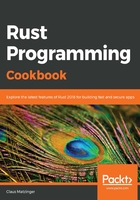
上QQ阅读APP看书,第一时间看更新
How to do it...
For this recipe, the steps are as follows:
- Create a new project using cargo new execution-flow -- lib and open the project in an editor.
- Basic conditionals such as if statements work just like in any other language, so let's start with those and replace the default mod tests { ... } statement in the file:
#[cfg(test)]
mod tests {
#[test]
fn conditionals() {
let i = 20;
// Rust's if statement does not require parenthesis
if i < 2 {
assert!(i < 2);
} else if i > 2 {
assert!(i > 2);
} else {
assert_eq!(i, 2);
}
}
}
- Conditionals in Rust can do much more! Here is an additional test to show what they can do—add it before the last closing parenthesis:
#[test]
fn more_conditionals() {
let my_option = Some(10);
// If let statements can do simple pattern matching
if let Some(unpacked) = my_option {
assert_eq!(unpacked, 10);
}
let mut other_option = Some(2);
// there is also while let, which does the same thing
while let Some(unpacked) = other_option {
// if can also return values in assignments
other_option = if unpacked > 0 {
Some(unpacked - 1)
} else {
None
}
}
assert_eq!(other_option, None)
}
- A conditional isn't the only statement that can be used to change the flow of execution. There is, of course, also the loop and its variations. Let's add another test for those as well, starting with a few basics:
#[test]
fn loops() {
let mut i = 42;
let mut broke = false;
// a basic loop with control statements
loop {
i -= 1;
if i < 2 {
broke = true;
break;
} else if i > 2 {
continue;
}
}
assert!(broke);
// loops and other constructs can be named for better
readability ...
'outer: loop {
'inner: loop {
break 'inner; // ... and specifically jumped out of
}
break 'outer;
}
- Next, we will add more code to the test to see that loops are regular statements that can return values and that ranges can be used in for loops as well:
let mut iterations: u32 = 0;
let total_squared = loop {
iterations += 1;
if iterations >= 10 {
break iterations.pow(2);
}
};
assert_eq!(total_squared, 100);
for i in 0..10 {
assert!(i >= 0 && i < 10)
}
for v in vec![1, 1, 1, 1].iter() {
assert_eq!(v, &1);
}
}
- With these three tests prepared, let's run cargo test to see them working:
$ cargo test
Compiling execution-flow v0.1.0 (Rust-Cookbook/Chapter01/execution-flow)
warning: value assigned to `broke` is never read
--> src/lib.rs:20:17
|
20 | let mut broke = false;
| ^^^^^
|
= note: #[warn(unused_assignments)] on by default
= help: maybe it is overwritten before being read?
Finished dev [unoptimized + debuginfo] target(s) in 0.89s
Running target/debug/deps/execution_flow-5a5ee2c7dd27585c
running 3 tests
test tests::conditionals ... ok
test tests::loops ... ok
test tests::more_conditionals ... ok
test result: ok. 3 passed; 0 failed; 0 ignored; 0 measured; 0 filtered out
Now, let's go behind the scenes to understand the code better.